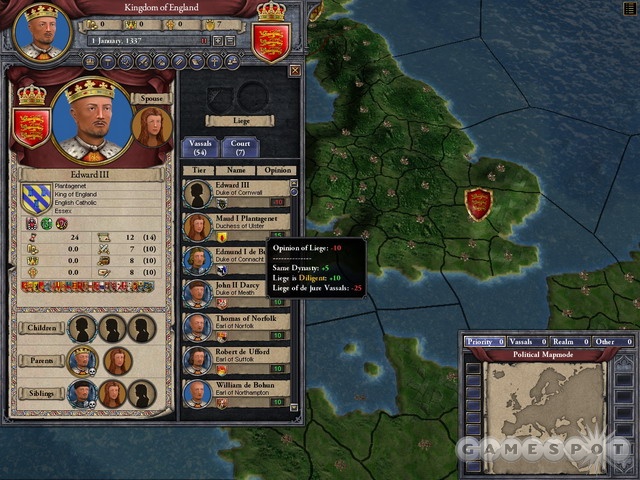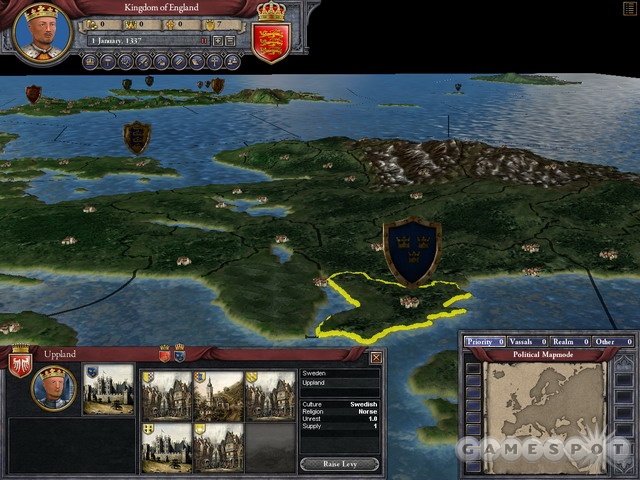Crusader Kings II Q&A - First Details
Get the first details on this ambitious role-playing-heavy strategy game from game designer Chris King.
The original Crusader Kings took the grand strategic mission of conquering Europe and humanized it with intriguing character-specific role-playing elements that made your ruler an actual personage, with different traits, quirks, and even a dirty little secret or three. Developer/publisher Paradox has announced that it is developing a sequel, and we got the first details from designer Chris King.

GameSpot: Give us an overview of Crusader Kings II. When does it take place and what key wars and other historically momentous events does the game encompass?
Chris King: The game covers all of Europe, North Africa, and the Middle East. It starts in 1066 and ends at the start of the 15th century. Obviously, as the title implies, it also encompasses the Crusades, with the pope making periodic calls to catholic Europe to take the cross. However, we are trying to encompass the whole sweep of European history. In the East, we have the fall of the Byzantine Empire and the Muslim advance in Europe. The Mongol hordes come out of the steppes to wreak havoc. In Iberia, we have the Reconquista and the Christian advance. We open the game with the Norman Conquest of England, and that, in turn, makes the English crown a player in French politics, setting the scene for the Hundred Years' War. We also seek to capture the struggle between the emperor and pope in the Holy Roman Empire.
GS: Some newer players found the original game to be intimidating. Any plans to make the sequel more accessible?
CK: We are putting a lot of thought into the interface of the game. We are seeking to streamline it to make information easier to find. We're also looking at the message system. At the moment, our games have an all-or-nothing approach to messages, making the whole system more flexible. You can choose which types of messages you get. As king of England, you may well be interested in what the king of France is up to, but you're probably not going to be as interested in the activities of the princes of Kiev.
GS: One of the most intriguing aspects of the original game was the way that players not only assumed control of a nation, but also took the role of a ruler with various abilities and personality quirks--a feature that made the conquest of the known world a much more human and dramatic undertaking. Will individual rulers be making a comeback in Crusader Kings II? If so, how will they be different and better?
CK: Absolutely. In fact, the whole concept of a "country" no longer exists in Crusader Kings II. Instead, you now play a character who has titles, which confer various rights to the character. But the biggest change is in the way events work. Specifically, you simply may not be able to select certain options, depending on your ruler's traits. So, if your character is a nice guy, he won't be able to select the nasty events. Similarly, if your character is an idiot, he won't be able to make the wise choices. Each character should play differently.
GS: Any plans to otherwise enhance the role-playing game-like quality of the original game by fleshing out individual ruler development?
CK: We are adding a new system for the development of young characters. As was the trend back in that era, you will send your children to other characters to foster them. The traits and skills of these characters will, in turn, influence your character's development.
GS: What other enhancements are going to be added to the sequel?
CK: The biggest change we have made is the way character relations work. In the first game, this was a steadily changing value. But in the game, the way this worked was that you would look at your country, have everything seem to be fine, have nothing change, and then all of sudden…all your vassals hated you and your realm collapsed. In Crusader Kings II, we have a system of static relation modifiers, so people will still hate you, but you can clearly see how much and why. This will make the whole business of war and peace much easier.
GS: The previous game from 2004 built on the gameplay and systems Paradox had created with Europa Universalis. Now that more time has passed and Paradox has since authored other grand strategy games, what are some of the key lessons that the team is taking with it into the sequel's development?
CK: We have a stated goal of trying to make an internally playable version of the game as early as we can. It won't be complete and there won't be much of an artificial intelligence, but the sooner we have it in, the sooner we will be able to start testing and seeing how the features are working. This will mean we can start refining our game features based on real playing experience much earlier than we did in, say, Victoria 2. We believe this will let us create our best title to date.

GS: Finally, is there anything else you'd like to add about Crusader Kings II?
CK: The map looks awesome!
GS: Thank you.
Got a news tip or want to contact us directly? Email news@gamespot.com
Join the conversation